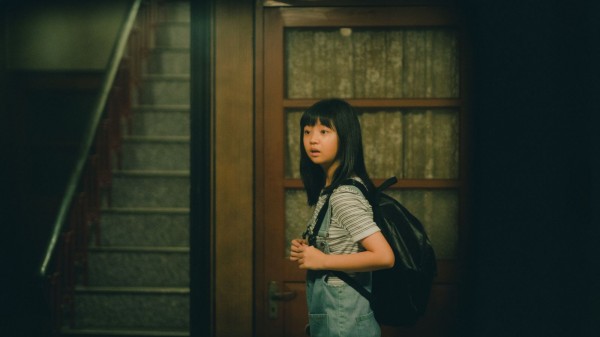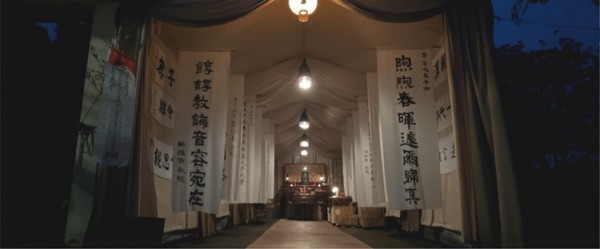-
THE FUNERAL 頭七 (Dan-guei Shen, Taiwan 2022)
DAN-GUEI SHEN: THE FUNERAL 頭七 (TAIWAN, 2022)

WU YIHAN IN THE FUNERAL
Bad reception
The visuals are generally elegant in this slow-burner horror film from Taiwan, which blends family conflict with folk evil spirits and explodes into traditional intensified scares and excitement in the last twenty minutes of its 103-minute run-time. An uncomfortable mood is definitely created, though some moments are just too conventional and a perceivable disconnect between the opening and later sections reveals a certain weakness in a screenplay that has some inconsistencies.
The family conflict, and the elaborate focus on funerary ritual, makes one wonder if this couldn't just have been a straight socio-psychological drama. On the other hand, for horror genre fans, all the delving into personal issues may seem to get in the way. Central is a mother, Chun-hua (Selina Jen Chia-Hsuan) and her teenage daughter Qin Xuan (Wu Yihan), who live in Taipei. The daughter suffers from kidney disease and is delicate, needing a transplant. The pic opens with a long sequence where mom, working in a large convenience store at night, walks around continually spooked by odd noises, then a power outage. Later, she and her daughter go out to the family seat in the country - a Chinese language site, Movies and Culture calls it "a dimly lit old mansion" - for the funeral and seven-day wake of mom's grandfather where they are met first by an unfriendly reception from relatives, then by the hostile pursuit of unfriendly spirits. The daughter meets family members she's never known. They are just as unfriendly as the spirits. This world is both familiar and unfamiliar for the mother now.
It turns out Chun-hua hasn't been back in a decade because there was a falling out when she became pregnant out of wedlock refusing to reveal the father's identity or to end the pregnancy as her parents, especially her father (Chen Yi-Wen) wanted, and went to Taipei to raise the child on her own. Her parents have not forgiven her for this. Her father, the most convincingly disagreeable, walks up and simply says, "You are not welcome here." That's about as malevolent as family relations can get, and no folk evil spirits are needed to reinforce it. Mom is nearly as unpleasant. More comes to show Chun-hua's mistreatment in early life, but this is never resolved or explained.
A "large mourning hall built in the countryside" (the Chinese site again) is an impressive reference point of the film that is both grand and scary, a place where "The hanging couplets and yellow curtains make people feel chills down their spines." The daughter is afraid to go to the funeral, so mom goes alone, and while separated from the girl is attacked by a peripheral family member (Na-Do) who, lacking legitimacy, has been excluded from the will and is enraged by this.
While her parents have told her to leave, Chun-hua is determined to remain for the traditional seven days of ritual surrounding a funeral, with the soul wandering on preceding days and set free on the seventh (and sometimes multiple seven-day rituals thereafter). There is a Taoist priest on hand played by Chen Jiakui. We don't quite get to the full ritual, because in the last quarter hour of the film all hell breaks loose, with some possessed by malevolent spirits and violence entering the mourning hall for a dramatic and surprising finale. The site I've cited says this is the best horror movie ever made in Taiwan. Maybe, maybe not; horror fans may like only the last part, but tech features are good throughout and the late scenes have good visuals.
(For more about the plot complications I defer to Don Aneli on Letterboxd who has the only lengthy discussion at present, in English at least.)
The Funeral 頭七 ("The First Seven"), 103 mins. Screened for this review as part of the July 15-30, 2022 New York Asian Film Festival, the film's international premiere. It debuted in Apr.1, 2022 at the Quingming Festival in Taiwan.
NYAFF SHOWTIMES:
Wednesday Jul 20, 9:00pm (Walter Reade Theater, Film at Lincoln Center)

THE "LARGE MOURNING HALL BULIT IN THE COUNTRYSIDE"
Last edited by Chris Knipp; 07-13-2022 at 01:27 AM.
 Posting Permissions
Posting Permissions
- You may not post new threads
- You may not post replies
- You may not post attachments
- You may not edit your posts
-
Forum Rules






 Reply With Quote
Reply With Quote
Bookmarks